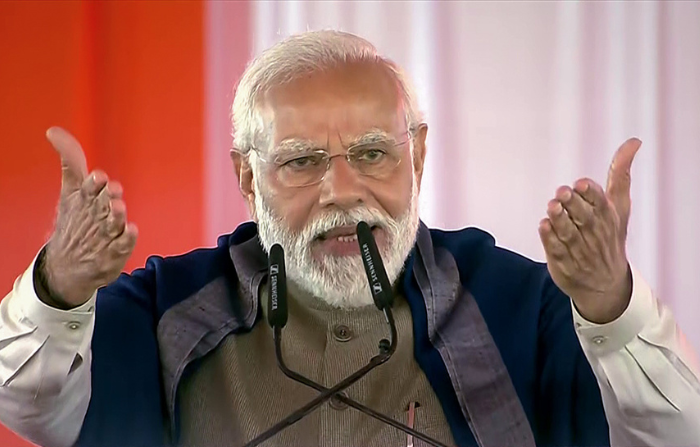- Friday, April 04, 2025
It marked the first instance of Indian intelligence personnel openly discussing the purported operations in Pakistan, a report by The Guardian said.

By: Shubham Ghosh
IN a sensational revelation, intelligence operatives from India and Pakistan have said that the Indian government conducted targeted assassinations in Pakistan as a component of a broader strategy aimed at eliminating terrorists residing in foreign territories, The Guardian has reported after speaking with the agents.
Insights gleaned from interviews with intelligence officials from the two neighbours, alongside documents provided by Pakistani investigators, offer fresh perspectives on India’s purported engagement in carrying out assassinations abroad.
The initiative allegedly forms part of an assertive national security approach adopted by India’s foreign intelligence agency, the Research & Analysis Wing (RAW), following developments after 2019.
RAW operates directly under the office of the Indian prime minister, Narendra Modi, who is currently seeking reelection for a third term in office, with elections kicking off later this month.
Read: India asks USA’s FBI to share intelligence on Sikh separatists: report
The accounts seem to lend further credence to accusations that New Delhi has adopted a policy of targeting individuals it deems hostile to India. While the recent allegations primarily pertain to individuals accused of serious and violent terrorist offenses, India has also faced public accusations from western nations such as the US and Canada about its alleged involvement in the killings of protesting figures, including a Sikh activist in Canada, and a failed assassination attempt on another Sikh individual in the US last year.
Read: Soon, India to have intelligence gathering posts along China border
These fresh claims revolve around nearly 20 killings since 2020, carried out by unidentified assailants in Pakistan. While India has previously been informally linked to these incidents, this marks the first instance of Indian intelligence personnel openly discussing the purported operations in Pakistan, with detailed documentation alleging RAW’s direct role in these killings.
Moreover, the allegations indicate that Sikh separatists associated with the Khalistan movement were targeted as part of these Indian foreign operations, both within Pakistan and in Western countries.
As per Pakistani investigators, the fatalities were reportedly coordinated by Indian intelligence sleeper cells, primarily based in the United Arab Emirates. The surge in killings last year was attributed to heightened operations of these cells, which are accused of offering substantial sums of money to local criminals or impoverished Pakistanis to execute the murders. Additionally, Indian agents purportedly recruited jihadists to conduct the shootings, deceiving them into believing that they were targeting “infidels”.
Two Indian intelligence officers told The Guardian that the spy agency’s focus on dissidents overseas was triggered by the deadly terror attack in Pulwama in the former Indian state of Jammu and Kashmir in February 2019, when a suicide bomber rammed an explosive-laden vehicle into a military convoy, killing 40 paramilitary personnel. Jaish-e-Mohammed, a Pakistan-based terror group, had claimed responsibility.
It happened months before Modi won his second term in office.
“After Pulwama, the approach changed to target the elements outside the country before they are able to launch an attack or create any disturbance,” one Indian intelligence operative was quoted as saying. “We could not stop the attacks because ultimately their safe havens were in Pakistan, so we had to get to the source.”
He added that such operations required a nod from the highest level of the government.
The officer said that India had drawn inspiration from the working style of Mossad and KGB, the intelligence agencies of Israel and Russia, respectively, that have been linked to extrajudicial killings abroad.
He even said that the murder of Saudi journalist and dissident Jamal Khashoggi in the Saudi embassy in Istanbul, Turkey, in 2018, had also been cited by RAW officials.
“It was a few months after the killing of Jamal Khashoggi that there was a debate among the top brass of intelligence in the prime minister’s office about how something can be learned from the case. One senior officer said in a meeting that if Saudis can do this, why not us?” he said.
“What the Saudis did was very effective. You not only get rid of your enemy but send a chilling message, a warning to the people working against you. Every intelligence agency has been doing this. Our country cannot be strong without exerting power over our enemies.”
Senior officials from two distinct Pakistani intelligence agencies expressed suspicions over India’s potential involvement in up to 20 killings since 2020. They cited evidence from previously undisclosed investigations into seven of those cases, which reportedly include witness testimonies, arrest records, financial statements, WhatsApp messages, and passports.
According to investigators, these materials provide detailed insights into the operations carried out by Indian operatives to assassinate targets within Pakistan. While The Guardian reviewed these documents but their authenticity could not be independently verified.
Sources in the intelligence said the targeted assassinations increased significantly last year, accusing India of involvement in the suspected deaths of about 15 people, most of whom were shot from a close range by unidentified gunmen.
India’s ministry of external affairs denied the allegations while responding to The Guardian, and reiterated an earlier statement that they were “false and malicious anti-India propaganda”.
It also emphasised a previous denial made by India’s foreign minister Subrahmanyam Jaishankar that targeted killings in other countries’ soil were “not the government of India’s policy”.
Analysts believe, The Guardian added, that Pakistani authorities have been hesitant to acknowledge the killings publicly since most of the targets are known terrorists and associates of outlawed militant outfits that the country has denied giving shelter to.